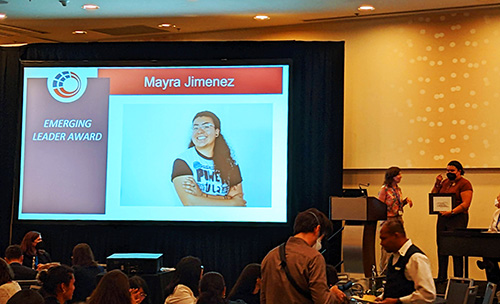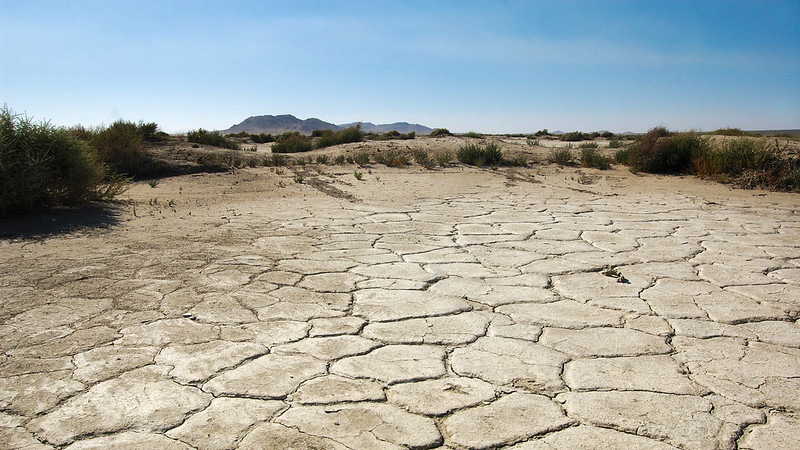Blog
AP19 Roundup: AJ and CAPA Take The Message National
 The first disconcerting aspect of the U.S. Alcohol Policy Alliance's semiannual conference was not the sheer number of research, policymakers, and advocates. It was not the bleak but historical grandeur of its Washington, DC setting. No, it was the fact that the 2022 conference was labeled "Alcohol Policy 19," suggesting we had somehow time traveled.
The first disconcerting aspect of the U.S. Alcohol Policy Alliance's semiannual conference was not the sheer number of research, policymakers, and advocates. It was not the bleak but historical grandeur of its Washington, DC setting. No, it was the fact that the 2022 conference was labeled "Alcohol Policy 19," suggesting we had somehow time traveled.
In some ways, it felt appropriate, as Alcohol Justice and California Alcohol Policy Alliance (CAPA) staff met face-to-face (albeit while masked) with people who had only existed through Zoom screens for the past three years. In other ways, it felt odd: the entire tenor of alcohol policy had shifted amidst the enormous deregulatory changes pursued by alcohol industry during the COVID-19 lockdowns.
Howeverer the most startling--in a good way--aspect of AP19 was the surprise award given to CAPA Advocacy Manager Mayra Jiménez. Recognizing her tireless and, more importantly, effective work in organizing communities in Los Angeles and across California to protect public health and safety, the intended honor was nonetheless never shared with Jiménez herself until she was summoned to the stage during the Thursday luncheon to receive it.
In fact, organizers had to hunt her down. She was nowhere near the banquet hall, instead remaining in a presentation side-room, speaking with participants in her "Popular Education for Policy Change" workshop, sharing the CAPA organizing model with would-be advocates from across the country. In a perfect bit of irony, the reason why she earned the award was nearly the reason why she was not there to receive it.
Jiménez was also heavily involved in the pre-conference Advocacy Institute, while Research Director Carson Benowitz-Fredericks reported on both local San Rafael campaigns to reform retail environments, and statewide concerns over the enshrinement of temporary alcohol control "regulatory relief" into law. Because nothing is quite as upsetting as the continued creep of alcohol industry power and the harms that come with it.
READ MORE about the Alcohol Justice-affiliated presentations at AP19.
READ MORE live Tweets from AP19.
How Dry I Am: Big Alcohol Mines Mexico for Water
Amidst the crushing Southwest drought, Mexican breweries let companies channel dwindling water supplies into the United States.The repeated prosection/persecution of Mexicali Resiste activists
 was not enough to get the Mexican federal government to step in. The daylight assassination of an advocate for indigenous farmers' water access in Tecate was not enough to get the Mexican federa government to step in. Only in the face of a crippling water crisis that has many households in Northern Mexico reliant on water tankers has Mexican President Andrés Manuel López Obrador called for a moratorium on brewery operations in the parched region.
was not enough to get the Mexican federal government to step in. The daylight assassination of an advocate for indigenous farmers' water access in Tecate was not enough to get the Mexican federa government to step in. Only in the face of a crippling water crisis that has many households in Northern Mexico reliant on water tankers has Mexican President Andrés Manuel López Obrador called for a moratorium on brewery operations in the parched region.The dire state has been caused by a confluence of historical and environmental factors. Anthropogenic climate change has created drought conditions in western North America that have not been seen in over a millenium. Absent regular rainfall, the entire region relies on two sources: riverflow, and groundwater. Meanwhile, northern Mexico's access to watersheds is blocked upstream by treaties entitling U.S. states to the lion's share of cross-border flows, particularly of the Colorado River which is nonetheless vitally important to Mexcali and Tecate. Yet it is impossible to truly characterize the crisis afflicting northern Mexico without looking at the actions of industries in the region--of which the breweries occupy a position somewhere between emblematic and epidemic.
U.S. consumers have a taste for imported beer. According to the beer institute, one out of every six beers consumed in the U.S. is imported. Of those imports, an overwhelming 80% comes from Mexico. There are policy reasons for this discrepancy: antitrust and consumer laws require that beers labeled as Mexican be actually produced in Mexico. There are economic ones as well: the lower wage standards across the border make production mere miles from the United States a cost-effective strategy. (This plays out in the strange mirror that is Calexico, in California, and Mexicali, in Baja California. The two cities are essentially a single metropolis cut through by the border. Yet because all the manufacturing occurs in Mexico, Mexicali's population is at least 20 times larger than its sister's.)
In a condition when faucets cough dust, it is nothing short of aggressive resource extraction, with the U.S. letting some trickles flow towards the Gulf of California before intercepting it and shipping it right back north.
López Obrador's intervention may mean a slight relief for the dessicated northern Mexican states. (It also, at this writing, still just words.) But it may also simply mean moving the site of extraction. After years of tenacious opposition by Mexicali Resiste and other local water defense activists, Constellation Brands supposedly shuttered their border brewery and relocated to Veracruz to reduce water impacts. This move appears to address border concerns, but only because news of Veracruz's own water crisis is harder to come by.
As this water crisis deepens and western North America becomes forced to accept the possibility of new, arid norms, it becomes impossible to treat water as an endless boon, and ignore the complicity of industries like alcohol producers in perpetuating crisis while pursuing profits. The United States can no longer afford to dry up Mexican wells just to wet consumer palates.
READ MORE about the struggles and triumphs of Mexicali Resiste.
Image by tschundler via Flickr, used under Creative Commons license.
The Liquor Bottle Label Battle: Medical Community Rallies Around Alcohol Health Warnings
 It seems like such a simple thing: letting consumers know what is in the thing they are about to put in their body. But ever since Upton Sinclair's The Jungle, it's been a laborious slog to get corporate actors to simply engage transparently with the products they profit from. Now the idea that public has a right to know the risks and contents of their own recreation has come for the alcohol industry.
It seems like such a simple thing: letting consumers know what is in the thing they are about to put in their body. But ever since Upton Sinclair's The Jungle, it's been a laborious slog to get corporate actors to simply engage transparently with the products they profit from. Now the idea that public has a right to know the risks and contents of their own recreation has come for the alcohol industry.Big Alchool and its lackies responses have been, predictably, apocalyptic and desperate.
In 2020, Canadian researchers got permission to place prominent alcohol health labels on products at the state liquor store in Whitehorse, Yukon. Preliminary findings were encouraging, showing a slight decrease in purchasing of labeled products compared to both nonlabeled in that store, and all (unlabeled) products in a control store in another city. In addition, consumers were more likely to recognize the health risks in the labeled bottles and more likely to support policies to limit that risk. What was in equal parts encouraging, discouraging, and insane, however, was the lawsuit threatened by the alcohol industry to suppress the labels calling attention to cancer risk.
To be clear, the cancer risk from alcohol use is noncontroversial. And yet the Canadian team noticed that recognition of that risk was low. What they also noticed is that the lawsuit may, ironically, have driven awareness of the risk even higher--from the coverage and the sense that the state and the medical researchers were being pushed around by faceless corporations.
Since then, the impetus for confronting the industry head-on has been snowballing. In September, the New England Journal of Medicine, one of the preeminent medical journals in the country, ran an op-ed from Harvard Chan School of Public Health researchers detailing the evidence and need for these labels. "The alcohol industry spends more than $1 billion each year to market its products in the United States," the authors write. "As a result, the most readily available information about alcohol comes from alcohol companies themselves. The industry has also actively suppressed efforts to educate consumers about the health risks associated with alcohol."
The authors go on to observe that effective labelling has already been demonstrated in tobacco control science. The most effective labels are 1) displayed prominently on the front of product packaging, 2) designed to include photographs or icons, not just text, and 3) rotated from month to month or bottle to bottle to prevent consumers from getting inured to the message.
If this sounds like a reasonable proposal from a creditable source that no one in their right mind could argue with, then you haven't met the water-carriers for Big Alcohol. The Washington Times has already decided that alcohol warning labels are synonymous with Prohibition. (Crucially, the Times did not mention the cancer warnings, only ingredient labels--while the op-ed is incoherent at best, it seems Big Alcohol's lackeys learned at least one thing from the Canadian experience.) The industry salvos will keep coming, as they always have. And the more they do, the more opportunity the public health community will have to explain the truth, until stamping on a bottle is no more controversial than a bottlecap.
READ MORE about the demand for effective labeling of alcohol.
READ MORE about the cash and deception behind "healthy drinking."
Image by Nicolas Raymond via Flickr, used under Creative Commons license.
2022 California Legislative Roundup: Defending Against Deregulation
 The California 2021-2022 legislative sessions has finally, mercifully, drawn to a close. Fueled by a massive, nationwide and international industry push to make emergency COVID-19 deregulatory measures permanent, Alcohol Justice and the California Alcohol Policy Alliance (CAPA) faced an unprecedented array of dangerous bills. Most prominently among these, the 4 A.M. bar bill made its fourth appearance in five years, and again went down to defeat amidst a widespread rejection of the cynical and cavalier assumptions made by its authors. Organizing throughout the Central Valley and Los Angeles area, much of it involving CAPA members, helped local communities shout down the economic interests of Big Alcohol. That wasn't the only fight CAPA and AJ were involved in this year.
The California 2021-2022 legislative sessions has finally, mercifully, drawn to a close. Fueled by a massive, nationwide and international industry push to make emergency COVID-19 deregulatory measures permanent, Alcohol Justice and the California Alcohol Policy Alliance (CAPA) faced an unprecedented array of dangerous bills. Most prominently among these, the 4 A.M. bar bill made its fourth appearance in five years, and again went down to defeat amidst a widespread rejection of the cynical and cavalier assumptions made by its authors. Organizing throughout the Central Valley and Los Angeles area, much of it involving CAPA members, helped local communities shout down the economic interests of Big Alcohol. That wasn't the only fight CAPA and AJ were involved in this year.Like we do every year, we present a brief rundown of alcohol- and opioid-related legislation. The number of bills supported an opposed by CAPA and AJ are as follows:
| PASSED | FAILED | |
| AJ SUPPORT | 4 | 7 |
| AJ OPPOSE | 9 | 7 |
| CAPA SUPPORT | 1 | 0 |
| CAPA OPPOSE | 3 | 2 |
For purposes of each organization's "batting average," we use the following formula: (# of OPPOSED bills that FAILED + # of SUPPORTED bills that PASSED / total number of BILLS)
AJ went 11 for 27, for a 0.407 batting average.
CAPA went 3 for 6, for a 0.500 batting average.
For irrelevant context, major league batting average leader was Mets 2B Jeff McNeil, with 0.326.
A few of the key bills:
SB 930 aka The 4 A.M. Bar Bill Again Again Again Again. This bill, which would have extended last call hours in certain California cities to 4 a.m., has long been a bete noir for Bay Area lawmakers. Sen. Scott Wiener and coauthor Matt Haney (both D-San Francisco) re-introduced this bill--which had already been vetoed in 2018, failed in 2019, and was announced but pulled in 2020--as a mid-summer surprise gut-and-amend. The authors' hopes to rush it through the legislature before public awareness could build were short-lived, however, as an outpouring of community objection peeled off the cities hoping to be included in the legislation. The bill nonetheless made it to an Assembly floor vote, where it failed.
SB 980 aka The Secret Bar Bill. Another piece of legislation from Sen. Wiener, this bill would have made it much easier for bars to open without public awareness. It would also have facilitated legislative trickery by bad-actor applicants, and, most upsettingly, removed any obligated from ABC to deny a license based on close proximity to schools, parks, or other youth-oriented locations. On top of this, language in the bill made it considerably more difficult for license protesters to pursue that protest to its conclusion. The bill failed in committee.
SB 793 aka The Kids In Bars Bill. Yet another piece from Sen. Wiener, an obsessive industry deregulator and true friend of Big Alcohol, this would have waived any expectation that bars would deny entrance to underage patrons so long as there was a concert at some point that evening. Originally, the bill also included language creating Bourbon St.-style "party zones," although that language was stripped out. (Expect it to return.) The bill was passed and signed into law.
SB 1016 aka The Free and Appropriate Education for Individuals With FASD Bill. Authored by State Sen. Portantino (D-San Gabriel Valley), this bill expanded eligibility criteria for special education to include fetal alcohol spectrum disorders, guaranteeing appropriate and effective education for individuals with those disorders. Spearheaded by CAPA allies at the FASD Network of Southern California, the bill was passed and signed into law.
SB 620 aka The Don't Forget to Leave the Bottles Out for the Boozeman, Honey! Bill. While wine has long enjoyed a favored status in California with access to direct shipping denied other alcoholic products, beer and distilled spirits manufacturers both tried to claw out those privileges for themselves in 2022. Both those bills failed, in large part because the current situation--involving a three-tier system where manufacturers supply distributors who sell to retail stores and bars--is a job-creating engine. Manufacturers' abilities to cut out both distributors and retailers became an urgent labor issue, and union advocates joined AJ and CAPA in fighting this reckless legislation. It ran aground in the Assembly GO committee, and never moved to a floor vote.
More details on bills of note for Alcohol Justice are available HERE.
Details on opioid-related bills of note are available HERE.
Image by Mike Kalasnick on Flickr, used under Creative Commons license.
More Articles ...
Help us hold Big Alcohol accountable for the harm its products cause.
| GET ACTION ALERTS AND eNEWS |
STAY CONNECTED    |
CONTACT US 24 Belvedere St. San Rafael, CA 94901 415-456-5692 |
SUPPORT US Terms of Service & Privacy Policy |


